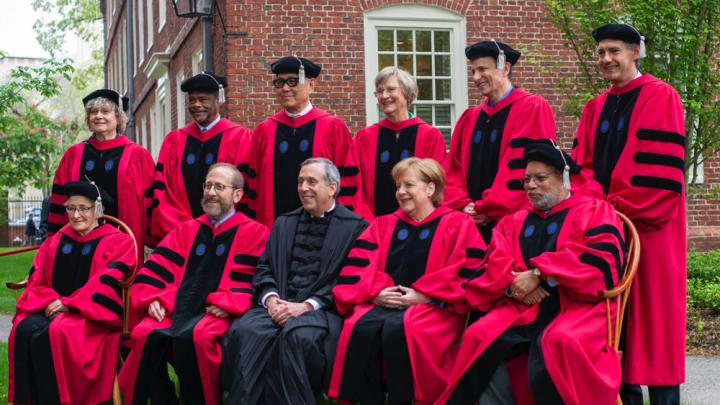DURING THE MORNING EXERCISES of the 368th Commencement, on May 30, Harvard planned to confer honorary degrees on five men and four women—the first cohort of honorands to receive their degrees from the University’s new, twenty-ninth president, Lawrence S. Bacow. They include significant representation from the academic sector; two women leaders (in government and in higher education); and, conspicuously, no one explicitly from popular or performing arts. The latter was an area of particular emphasis during the presidency of Drew Gilpin Faust, who retired in 2018—and who, in keeping with Harvard tradition, is the higher-education leader on whom the University will confer an honorary degree today.
Among them are:
- a distinguished curator and founding director of the National Museum of African American History and Culture, in Washington, D.C.—newly appointed secretary of the entire Smithsonian Institution;
- a preeminent scholar of income and wealth inequality in the United States;
- a social anthropologist whose research in Papua New Guinea yielded insights into gender that subsequently translated into pioneering work on kinship in the era of in vitro fertilization and assisted reproduction; and
- an acclaimed journalist who has edited The New Yorker for more than two decades.
Their fellow honorands include an honored mathematician and computer scientist, an historian of medieval Europe, and a scholar/curator whose work spans the long history of art in China.
The speaker for the afternoon exercises is also among the honorands, and by tradition comes last in the order of conferral of degrees. This year’s speaker is Angela Merkel, chancellor of Germany since 2005. Her presence necessitates tighter security precautions at the Morning Exercises than would be necessary absent a comparable visiting head of state.
The honorands are listed below in alphabetical order, not in the order of conferral of degrees. For details on the conferrals, check back for coverage of the morning ceremonies later today.
Lonnie G. Bunch III is founding director of the Smithsonian Institution’s National Museum of African American History and Culture. His week began especially festively with the announcement on May 28 that he had been appointed secretary of the Smithsonian. Before joining the museum in 2005, he was president of the Chicago Historical Society (2001-2005), following diverse curatorial assignments at the Smithsonian’s National Museum of American History (1989-2000), including service as associate director for curatorial affairs.
Ingrid Daubechies, a Belgian-born scholar, now Duke professor of mathematics and electrical and computer engineering at Duke University, is among the world’s most honored mathematicians. A pioneering researcher in the use of mathematical models to enhence image-compression technology, Daubechies is a member of the National Academy of Engineering, the National Academy of the Sciences, and the American Academy of Arts and Sciences.
Drew Gilpin Faust, Harvard University’s twenty-eighth president, served from 2007 through June 2018. Academically, her tenure was marked by its emphasis on expanding both engineering and applied sciences and art-making and performance within the curriculum. Institutionally, she steered the University through the global financial crisis and recession that took hold early in her term, and then led the restorative Harvard Campaign, which concluded last year with gifts and pledges of $9.6 billion. After stepping down from the presidency, she was honored by being appointed Porter University Professor.
William Chester Jordan, Dayton-Stockton professor of history at Princeton, is a prolific and widely acclaimed scholar of medieval Europe. Among his books are The Great Famine: Northern Europe in the Early Fourteenth Century, awarded the Haskins Medal of the Medieval Academy of America, and Louis IX and the Challenge of the Crusade: A Study in Rulership. He has edited a one-volume encyclopedia of the Middle Ages for elementary-school students and a four-volume edition for middle-school students.
Angela Merkel, sworn in as chancellor of the Federal Republic of Germany in November 2005, is the first woman and East German to hold this office. She has been a member of the German Bundestag since 1990, and has served the Christian Democratic Union’s deputy chair (1991-1998), general secretary (1998-2000), and chair (2000-2018). Her service as chancellor has coincided with the protracted financial crisis within the Eurozone, and the immigration crisis prompted in mid decade as refugees from the Libyan and Syrian wars, and other conflicts, poured into Europe (as documented in this Nieman Fellow’s photojournalism)—when Germany, under her leadership, was, at the time, an unusually generous host.
David Remnick has been editor of The New Yorker since 1998. Under his leadership, the magazine has won 48 National Magazine Awards in recognition of its superior journalism, criticism, and fiction. A distinguished reporter, known especially for his journalism on Russia and on Israel and the Middle East, Remnick won the Pulitzer Prize for his 1993 book on the Soviet Union, Lenin’s Tomb, and has published acclaimed biographies of Muhammad Ali and of Barack Obama.
Emmanuel Saez is professor of economics and director of the Center for Equitable Growth at the University of California, Berkeley. In 2009, he was awarded the American Economic Association’s John Bates Clark Medal, conferred on the most outstanding economist under the age of 40, and in 2010, he was awarded a MacArthur Fellowship. Saez is widely known for pioneering theoretical and empirical work on income and wealth inequality, including his important collaboration with Thomas Piketty (author of the internationally best-selling Capital in the Twenty-First Century) documenting income inequality historically in the United States.
Dame Marilyn Strathern, a social anthropologist, is renowned for her work with the Mount Hagen people of Papua New Guinea, based on which she challenged prevailing notions of gender norms, relations, and equality. [Corrected May 31, 2019, 8:00 a.m.: The title is The Gender of the Gift.] The Gift of Gender is perhaps her best-known publication derived from her work there. That research led her to a second field, reconsideration of human reproduction and kinship in light of new technologies such as in vitro fertilization. Now emerita, she was Wyse professor of social anthropology at the University of Cambridge from 1993 to 2008, and mistress of Girton College, Cambridge, from 1998 to 2009.
Wu Hung, Ph.D. ’87, is Vanderstappen Distinguished Service Professor in art history and East Asian languages and civilizations, and adjunct curator for Chinese art at the Smart Museum of Art, at the University of Chicago. He has published widely on traditional and contemporary Chinese art and art history, from The Art of Yellow Springs: Understanding Chinese Tombs and Contemporary Chinese Art to Zooming In: Histories of Photography in China and Remaking Beijing: Tiananmen Square and the Creation of a Political Space.
The University announcement appears here.








